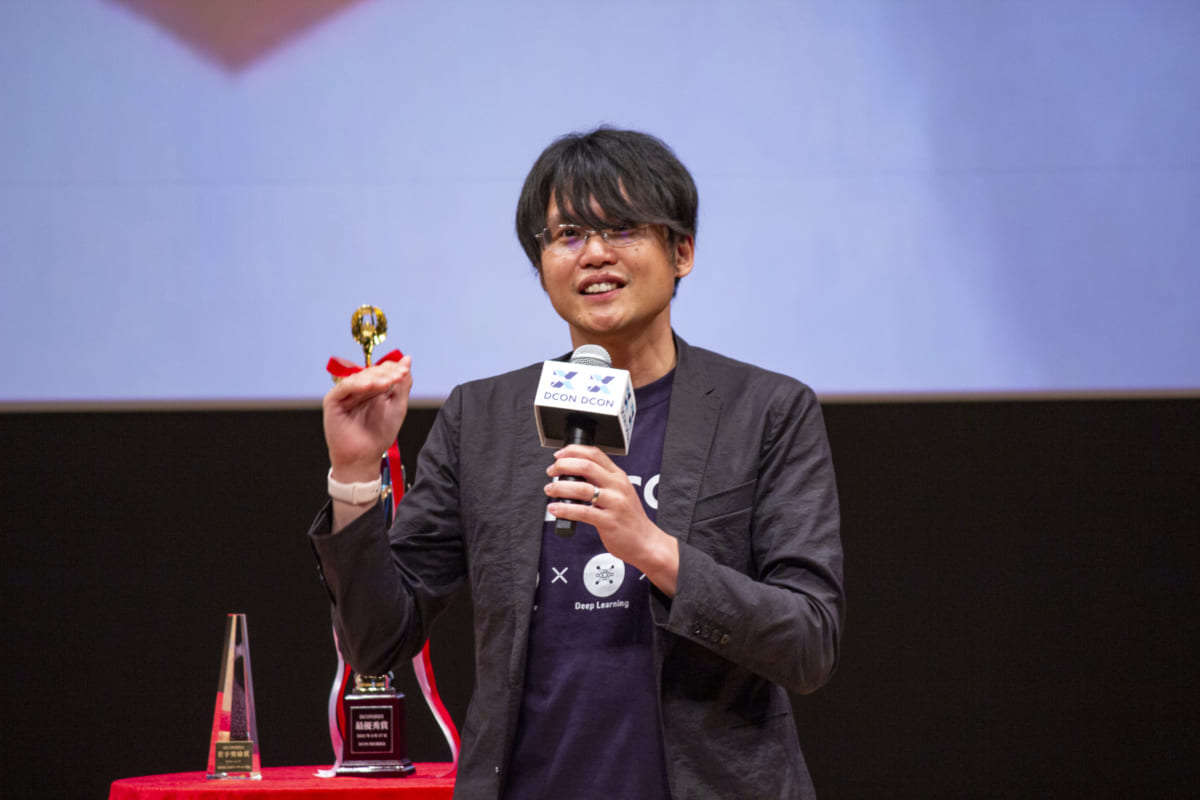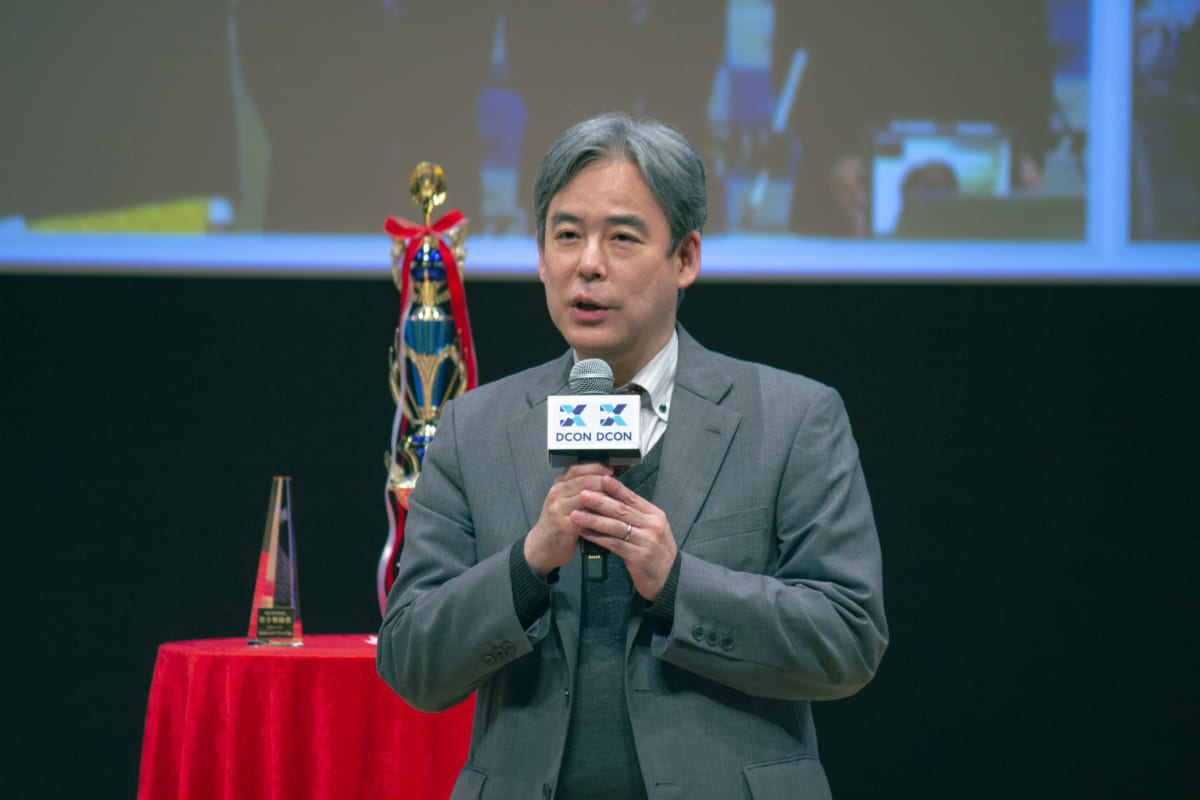On April 17, 2021 (Saturday), the final selection of the contest “DCON2021” was held, in which technical college students created businesses using deep learning technology and competed for the evaluation amount by judges including investors.
The winner was the Fukui National College of Technology/Programming Research Group team, which announced the aging diagnosis tool “D-ON”.
In this article, we will tell you the state and results of DCON2021 as a flash report.
Table of contents
- Overview of DCON2021
- State of the venue
- 10 teams of technical college students gathered from all over Japan
- Result announcement
- Company valuation ranking
- corporate award
- Technical Jury Award
- postscript
Overview of DCON2021
At “DCON2021”, the teams that passed the primary screening produced prototypes, and after a secondary selection by experienced entrepreneurs and other mentors, 10 teams were finally selected. Each of the 10 teams worked hard together with their mentors to create presentation materials and prepare for the final judging.
In the final round, presentations were judged in addition to the technical judgment, and five judges and two technical judges made the selection.
judge
Mr. Masafumi Kawai: Investment Manager, DBJ Capital Co., Ltd.
Mr. Tofuku Kawakami: Management Co-Creation Platform Co., Ltd. Co-owner (Partner) Managing Director
Tomotaka Goji: President, The University of Tokyo Edge Capital Partners (UTEC)
Mr. Katsumasa Niki: President and CEO, Deepcore Co., Ltd.
Masanao Matsumoto: WiL, LLC Co-Founder/General Partner
Technical review committee
Tetsuya Ogata: Professor at Waseda University and Fellow at Artificial Intelligence Research Center, National Institute of Advanced Industrial Science and Technology
Mr. Yutaka Matsuo: President of the Japan Deep Learning Association Professor at the University of Tokyo Graduate School
State of the venue


10 teams of technical college students gathered from all over Japan
A total of 43 teams applied for DCON2021, 5 of which were entries from overseas.
Presentations were made by 10 teams that were selected from among them and advanced to the final round.
| Kagawa National College of Technology/ TMT-2020 | Proposed AI sorting machine “Smart Mato” that supports cherry sorting work using deep learning . The size of cherries is automatically determined, and 8,000 cherries can be sorted by two people in one hour. Image recognition classifies the size of cherries into 4 levels and the presence or absence of blemishes into 2 levels. In the business plan, we introduced a model to rent to farmers for 10,000 yen per month. The cost of equipment is 70,000 yen. It can also be applied to other fruits. 10,000 yen including the belt conveyor (including hardware).It is assumed that part-time fruit sorting work can be reduced by about 1100 yen x 5 hours x number of people (8 people). |
| National Institute of Technology, Numazu College/ Flower Feelings | Announced “Electrical Kadan”, a to C business utilizing IoT. With the problem of dying flowers even for veterans, we propose quantitative solutions in the field of gardening, where there is a lot of ambiguous and sensory information.By taking a log of the growth status of flowers, you can translate the state of the flower and use it for gardening. You can use the app to see images and environmental data logs of the day’s flowers, and you can also interact with people and experts who have the same concerns in the community. LSTM is used to predict when flowers will wilt. The device body price is 4980 yen. The platform usage price is planned to be a free plan or 300 yen / month. |
| National Institute of Technology, Fukui College/ Programming Study Group | Proposed “D-ON” which performs hammering inspection by deep learning. A solution that aims to improve the efficiency of inspections of aging facilities with the vision of “protecting human lives from all deterioration”. Hammer sound data is measured with microcomputer-type equipment in different environments for each user. It can be easily learned on a personal computer (web application) and immediately used for on-site inspections.D-ON can handle aging inspections in all areas, compared to existing services that only target tunnels and bridges. |
| Asahikawa National College of Technology/ Asahikawa Tomato Study Group | A system that can estimate the state of tomatoes using deep learning and MR. When harvesting cherry tomatoes, the size is determined by the size of the mouth of the plastic bottle. By learning the data of 2,000 mini tomatoes, including sugar content, acidity, and size, it is now possible to predict the balance between sugar content and acidity using image recognition.In addition, it has been improved so that it can be used in the field of agriculture through a function that can be shipped when the shipment value is high based on the unit price forecast, and through MR glasses. |
| Toba National College of Technology/ ezaki-lab | Utilizing data obtained from oceanographic observation equipment, we propose the NoRIoT, a seaweed farming support system based on deep learning. We guarantee stable harvesting of seaweed and propose the optimum aquaculture method. It detects feeding damage to seaweed caused by ducks, etc., from image data captured by observation equipment, and predicts tide levels based on oceanographic data and meteorological forecast data from the Japan Meteorological Agency.Scheduled to be offered as a subscription. |
| Nagaoka National College of Technology/ Wakui Koi Farm | A carp whose price is determined by its appearance. It is sometimes traded in billions and has become a Cool Japan product. Inexperienced part-time workers are responsible for selecting a large number of carp when selecting from 15 million to 500. Therefore, we developed a device that automatically sorts juvenile Nishikigoi fish through a channel and automatically sorts them according to the output of a model learned by deep learning. Image data selected by craftsmen are used.Incorporate D2C and sell to enthusiasts on EC sites. The profits obtained will be returned to the craftsmen who provided their know-how, with the aim of developing the Nishikigoi industry. |
| National Institute of Technology, Okinawa College/ Nankurunaisa | Due to the declining birthrate and aging population, the decrease in the number of caregivers has become an issue. Aiming to realize a comfortable life for the elderly, we have developed a wheelchair equipped with deep learning called “Nankurunai Car”. The wheelchair has four functions.
Although it is still in the development stage, we are also developing a system that recognizes words. We are aiming for an innovative wheelchair with an entertainment element that is closely related to people. |
| Ishikawa National College of Technology/ Aiken | The number of shipments of smart speakers is expected to spread worldwide, and many products are still available. Aiken’s conversational robot “Oshaberu” has a highly customizable voice. It is possible for elderly people to synthesize the voices of their children and grandchildren (requires 25 hours of study time) and have Oshaberu speak the voices they like.We are currently preparing for a trial experience. In the future, we are considering increasing the number of compatible APIs, expanding overseas, and developing new functions. |
| Kitakyushu National College of Technology/ Nitkit Shigeru_Lab | There are 285 million visually impaired people in the world, and they lead a life of inconvenience. On the other hand, the number of guide dogs and helpers has not increased, so we developed a white cane “Guide Cane” that supports walking. It is a cane that recognizes the vertical and horizontal of the tactile block and the warning block, and notifies you with a vibration when you leave it.During the preparation period until then, experience-based events will be held to use the assistive device fee payment system and eliminate concerns about function and safety. We are considering offering it as a monthly (Manufacturing cost is 50,000 yen/unit) |
| Ichinoseki National College of Technology/ D’s>Zzz… | Among the causes of traffic accident fatalities, careless driving accounts for 15%. With the aim of preventing drowsy driving, we devised a device that prevents drowsy driving by applying vibrations to the soles of the feet. It is designed to detect drowsiness from the heart rate sensor and stimulate the feet.The main target is transportation companies, and the plan is 100,000 to 200,000 yen for one-time purchases and 20,000 yen per year for subscriptions. |
Result announcement
In the examination, in the same way as the evaluation of a venture company, the value when the team is assumed to be a company: variation, the significance of the business, the size of the market, the thoughts of the manager, sales and profits, etc. are taken into consideration in a complex manner. .
Company valuation ranking
3rd Place: National Institute of Technology, Kitakyushu College/Nitkit Shigeru_Lab “Blind Guide Cane”
Corporate valuation: 400 million yen
Investment amount: 50 million yen
2nd place: Toba National College of Technology / ezaki-lab “NoRIoT”
Corporate valuation: 500 million yen
Investment amount: 100 million yen
1st place (winner): National Institute of Technology, Fukui College / Programming Study Group “D-ON”
Corporate valuation: 600 million yen
Investment amount: 100 million yen

corporate award
| Aing Award: National Institute of Technology, Fukui College/ Programming Study Group “D-ON” Western Digital Award: National Institute of Technology, Toba College/ezaki-lab “NoRIoT”AGC Award: Toba National College of Technology/ezaki-lab “NoRIoT” KDDI Award: National Institute of Technology, Fukui College/ Programming Study Group “D-ON” TDK Prize: National Institute of Technology, Okinawa College/Nankurunisa – “Nankurunai Car” YAZAKI Award: National Institute of Technology, Numazu College/Flower Feelings “Electrical Flowerbed” |
Technical Jury Award
National Institute of Technology, Fukui College/ Programming Study Group “D-ON”

postscript
DCON 2022 has been decided.
JDLA announced that it will establish a fund to support technical college students.

